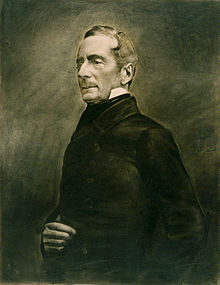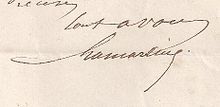Alphonse de Lamartine
Alphonse de Lamartine | |
|---|---|
 Albumin photograph by Nadar, 1856 | |
| Born | Alphonse Marie Louis de Prat de Lamartine 21 October 1790 Mâcon, Burgundy, France |
| Died | 28 February 1869 (aged 78) Paris, France |
| Occupation | Writer, poet, politician |
| Literary movement | Romanticism |
Alphonse Marie Louis de Prat de Lamartine (French pronunciation: [al.fɔ̃s.də.la.maʁ'tin] ; 21 October 1790 – 28 February 1869) was a French writer, poet and politician who was instrumental in the foundation of the Second Republic.
Career
Lamartine was born in Mâcon, Burgundy, on 21 October 1790.[1] His family was part of the French provincial nobility, and he spent his youth at the family estate. Lamartine is famous for his partly autobiographical poem, "Le lac" ("The Lake"), which describes in retrospect the fervent love shared by a couple from the point of view of the bereaved man. Lamartine was masterly in his use of French poetic forms. Raised a devout Catholic, Lamartine became a pantheist, writing Jocelyn and La Chute d'un ange. He wrote Histoire des Girondins in 1847 in praise of the Girondists.

He worked for the French embassy in Italy from 1825 to 1828. In 1829, he was elected a member of the Académie française. He was elected a deputy in 1833 and was briefly in charge of the government during the turbulence of 1848. He was Minister of Foreign Affairs from 24 February 1848 to 11 May 1848. Due to his great age, Jacques-Charles Dupont de l'Eure, Chairman of the Provisional Government, effectively delegated many of his duties to Lamartine. He was then a member of the Executive Commission, the political body which served as France's joint Head of State.
Lamartine was instrumental in the founding of the Second Republic of France, having met with Republican Deputies and journalists in the Hôtel de Ville to agree on the makeup of its provisional government. Lamartine himself was chosen to declare the Republic in traditional form in the balcony of the Hôtel de Ville.
During his term as a politician in the Second Republic, he led efforts that eventually led to the abolition of slavery and the death penalty, as well as the enshrinement of the right to work and the short-lived national workshop programs. A political idealist who supported democracy and pacifism, his moderate stance on most issues caused many of his followers to desert him. He was an unsuccessful candidate to the presidential election of 10 December 1848, receiving fewer than 19,000 votes. He subsequently retired from politics and dedicated himself to literature. He was made a Chevalier of the Legion of Honour in 1825.
Death and legacy

Lamartine ended his life in poverty, publishing monthly installments of the Cours familier de littérature to support himself. He died in Paris in 1869.
He is considered to be the first French romantic poet (though Charles-Julien Lioult de Chênedollé was working on similar innovations at the same time), and was acknowledged by Paul Verlaine and the Symbolists as an important influence.


On Catholic priests
Alphonse de Lamartine as quoted in "A Priest" By Robert Nash (1943) on Catholic priests:
There is a man in every parish, having no family, but belonging to a family that is worldwide; who is called in as a witness and adviser in all the important affairs of human life. No one comes into the world or goes out of it without his ministrations. He takes the child from its mother’s arms, and parts with him only at the grave. He blesses and consecrates the cradle, the bridal chamber, the bed of death, and the bier. He is one whom innocent children instinctively venerate and reverence, and to whom men of venerable age come to seek for wisdom, and call him father; at whose feet men fall down and lay bare the innermost thoughts of their souls, and weep their most sacred tears. He is one whose mission is to console the afflicted, and soften the pains of body and soul; to whose door come alike the rich and the poor. He belongs to no social class, because he belongs equally to all. He is one, in fine, who knows all, has a right to speak unreservedly, and whose speech, inspired from on high, falls on the minds and hearts of all with the authority of one who is divinely sent, and with the constraining power of one who has an unclouded faith.[2]
On Muhammad
In his book "Histoire de la Turquie" (1854), Alphonse de Lamartine writes:
If greatness of purpose, smallness of means, and astounding results are the three criteria of human genius, who could dare to compare any great man in modem history with Muhammad? The most famous men created arms, laws and empires only. They founded, if anything at all, no more than material powers, which often crumbled away before their eyes. This man moved not only armies, legislations, empires, peoples and dynasties, but millions of men in one-third of the then-inhabited world; and more than that he moved the altars, the gods, the religions, the ideas, the beliefs and souls.... His forbearance in victory, his ambition which was entirely devoted to one idea and in no manner striving for an empire, his endless prayers, his mystic conversations with God, his death and his triumph after death-all these attest not to an imposture, but to a firm conviction, which gave him the power to restore a dogma. This dogma was two fold: the unity of God and the immateriality of God; the former telling what God is, the latter telling what God is not; the one overthrowing false gods with the sword, the other starting an idea with the words. Philosopher, orator, apostle, legislator, warrior, conqueror of ideas, restorer of rational beliefs, of a cult without images; the founder of twenty terrestrial empires and of one spiritual empire, that is Muhammad. As regards all standards by which human greatness may be measured, we may well ask, is there any man greater than he.
Orientalism
Alphonse De Lamartine remains the most renowned Orientalist in Lebanon and the Middle East. After his trip to Lebanon, Syria and Palestine, in 1832–33 he had started to lose the Catholic faith, and during that trip in Beirut, on Dec. 7, 1832, he lost his only remaining child, Julia who had a coarctation of the aorta (as described in the manuscripts of Prince karam who was an expert on the works of Ibn al-Nafis). During his trip to Lebanon he had met the prince Bashir Shihab II and the prince Simon Karam who were both enthusiast of poetry and cardiac medicine. Until Now a valley in Lebanon is still called the valley of Lamartine as a commemoration of that visit, and the Lebanon Cedar forest still harbors the “Lamartine Cedar”, which is said to be the Cedar under which Lamartine had sat 200 years ago. Lamartine was very impressed by His trip to Lebanon that he staged his epic poem La Chute d’un ange – 1938- (“The Fall of an Angel”) in Lebanon.
Bibliography
| French and Francophone literature |
|---|
| by category |
| History |
| Movements |
| Writers |
| Countries and regions |
| Portals |
- Saül (1818)
- Méditations poétiques (1820)
- Nouvelles Méditations (1823)
- Harmonies poétiques et religieuses (1830)
- Sur la politique rationnelle (1831)
- Voyage en Orient (1835)
- Jocelyn (1836)
- La chute d'un ange (1838)
- Recueillements poétiques (1839)
- Histoire des Girondins (1847)
- Histoire de la Révolution (1849)
- Histoire de la Russie (1849)
- Raphaël (1849)
- Confidences (1849)
- Geneviève, histoire d'une servante (1851)
- Graziella (1852)
- Les visions (1853)
- Histoire de la Turquie (1854)
- Cours familier de littérature (1856)
See also
- French demonstration of 15 May 1848
- Lamartine Place Historic District in Manhattan, New York City
References
- ^ Whitehouse, Henry Remsen (1918). The Life of Lamartine, Volume 1. BiblioBazaar (2009). p. 13. ISBN 978-1-115-29659-5. Retrieved 14 November 2010.
- ^ in Nash, Robert "A Priest"
Further reading
- MacKay, John (2006). Inscription and Modernity: From Wordsworth to Mandelstam. Bloomington, IN: Indiana University Press. ISBN 0-253-34749-1. Retrieved 14 November 2010.
External links
- Works by Alphonse de Lamartine at Project Gutenberg
- Le Lac in English at Poems Found in Translation.
- Le lac Another English translation of Le Lac. More English translations at www.brindin.com .
- History of Vegetarianism: Alphonse de Lamartine
- Article on Lamartine from Bertrin, G. (1910) in The Catholic Encyclopedia. New York: Robert Appleton Company.
